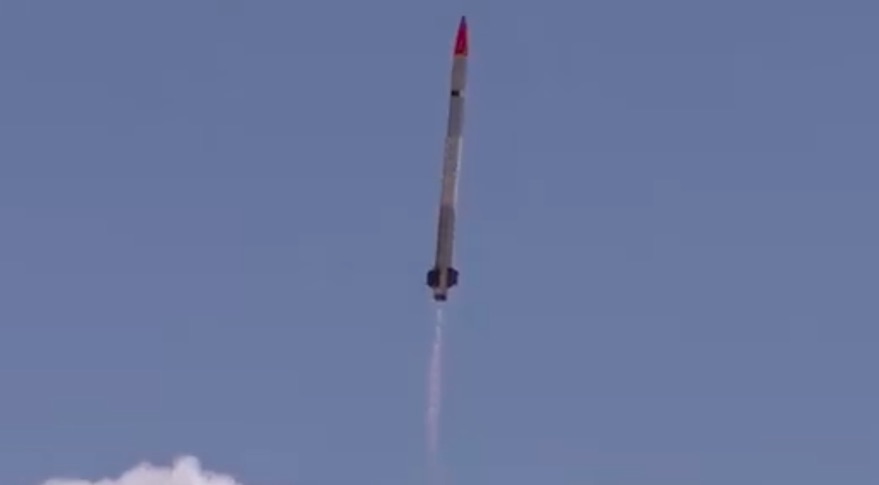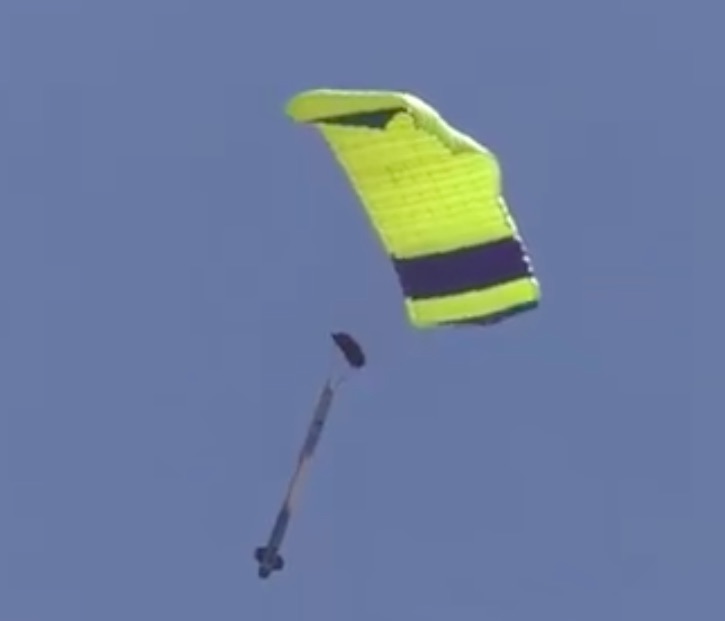Exos Suffers Setback in Reusable Suborbital Launch Attempt

WASHINGTON — A reusable suborbital rocket developed by Exos Aerospace suffered a loss of attitude control seconds after liftoff on a test flight June 29, but the rocket was still able to glide safely back to Earth.
Exos' Suborbital Autonomous Rocket with GuidancE, or SARGE, rocket lifted off from Spaceport America in New Mexico at about 2 p.m. Eastern. In the company's webcast, the rocket started gyrating seconds after liftoff before disappearing from view.
Controllers were able to reestablish some control of the rocket, aborting the flight. The rocket deployed a drogue parachute and parafoil while venting unused propellant. The rocket slowly descended under that parafoil, landing within view of the launch pad 14 minutes after liftoff.
Related: Exos Aerospace Launches SARGE Suborbital Rocket
"We had a performance challenge on our gimbal control for one reason or another," John Quinn, chief operating officer of Exos, said in brief comments at the end of the company's webcast. "It's a very, very sad day. However, any day you recover a rocket it is a good day."
Quinn didn't elaborate on the problem that caused the anomaly after liftoff, but expressed optimism the problem will be quickly identified and corrected. "Great improvement from last time on the recovery," he said of the vehicle's landing. "We'll be doing this again soon."
This launch, called Mission 3 by Exos, came after two earlier flights of SARGE in August 2018 and this March. Both those launches suffered some issues that prevented them from reaching the edge of space, but in neither case were those problems as severe as for this flight.
Breaking space news, the latest updates on rocket launches, skywatching events and more!
The company thought those earlier problems had been corrected. Quinn noted on the webcast prior to launch that the company had identified 93 lessons learned from the March launch that they incorporated into Mission 3.

The rocket was carrying educational, research and technology demonstration payloads from nine customers on this launch, ranging from a dust aggregation experiment from the University of Central Florida to a biomedical experiment for the Mayo Clinic. Exos expected the rocket to reach a peak altitude of more than 80 kilometers if all went as planned, providing those payloads with a brief period of microgravity before returning to Earth.
A successful flight, the company said prior to launch, would have allowed the company to move into more routine commercial operations of the vehicle, including making it eligible for indefinite delivery/indefinite quantity contracts from NASA's Flight Opportunities program. "With a successful flight we will leave the testing phase," Quinn said in a pre-launch statement.
Exos also hoped a successful test would allow it to move ahead with a small orbital launch vehicle called Jaguar. That vehicle will feature a reusable first stage using technology developed for SARGE, and be capable of placing 100 kilograms into low Earth orbit. The first launch of Jaguar is planned for late 2022, and Quinn said on the webcast the company is starting to hire personnel to work on that vehicle.
- Exos Aerospace Reflies Suborbital Rocket
- Government Shutdown Delays Commercial Rocket Launch
- Space Launch Calendar 2019: Sky Events, Missions & More
This story was provided by SpaceNews, dedicated to covering all aspects of the space industry.

Jeff Foust is a Senior Staff Writer at SpaceNews, a space industry news magazine and website, where he writes about space policy, commercial spaceflight and other aerospace industry topics. Jeff has a Ph.D. in planetary sciences from the Massachusetts Institute of Technology and earned a bachelor's degree in geophysics and planetary science from the California Institute of Technology. You can see Jeff's latest projects by following him on Twitter.


